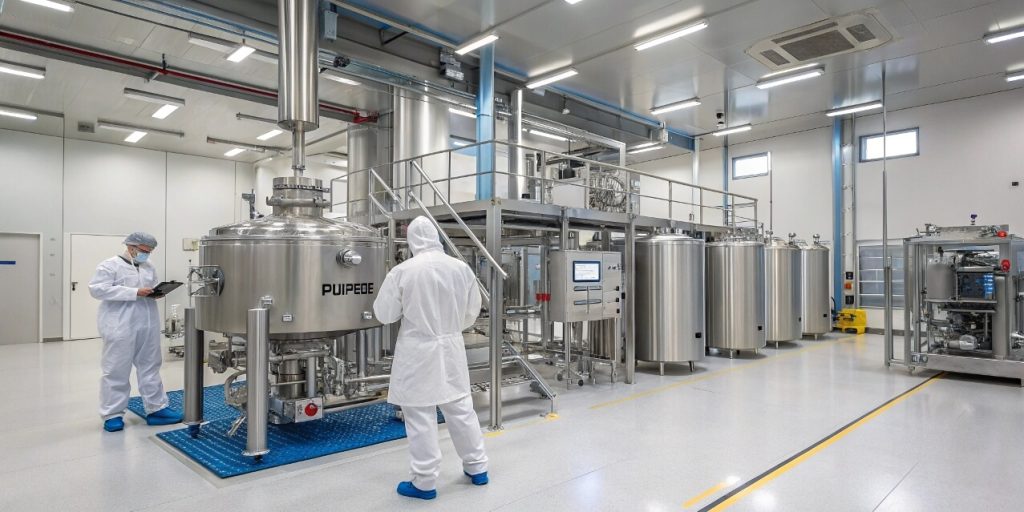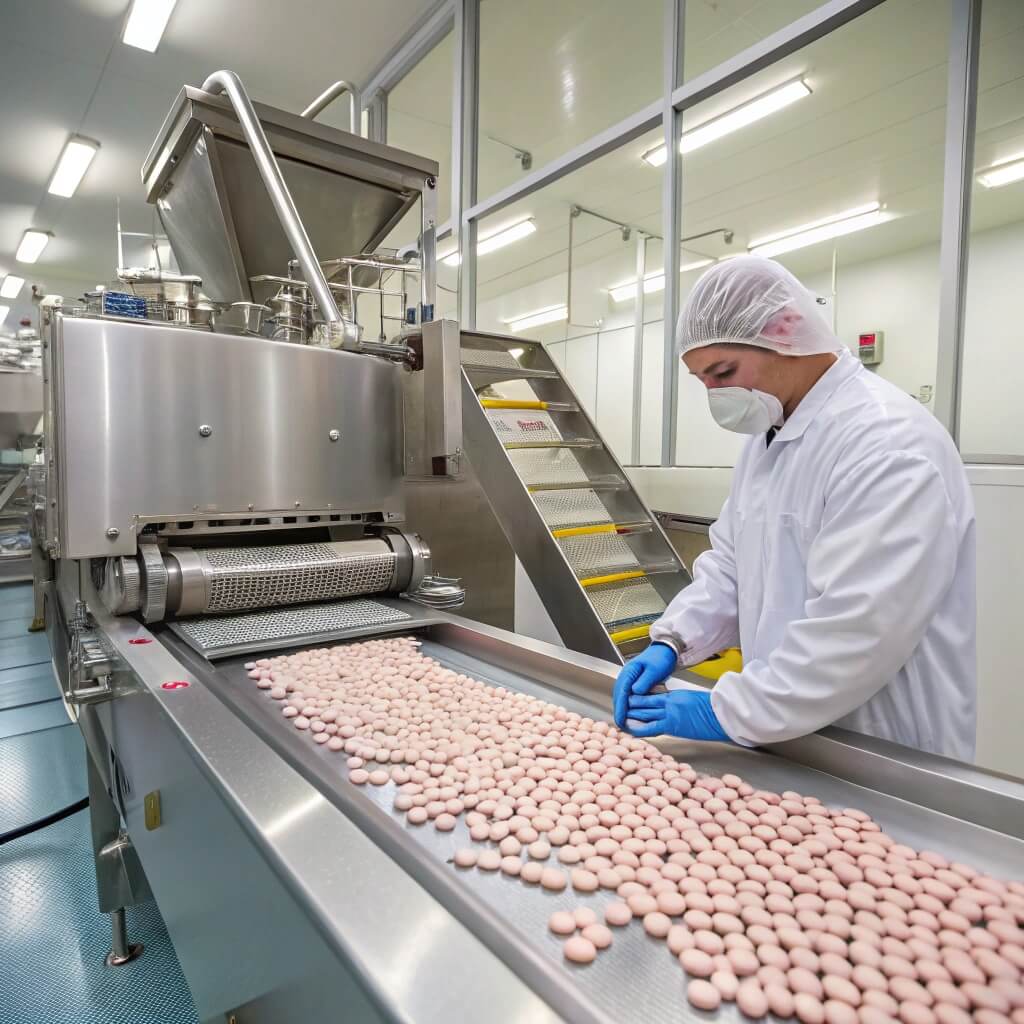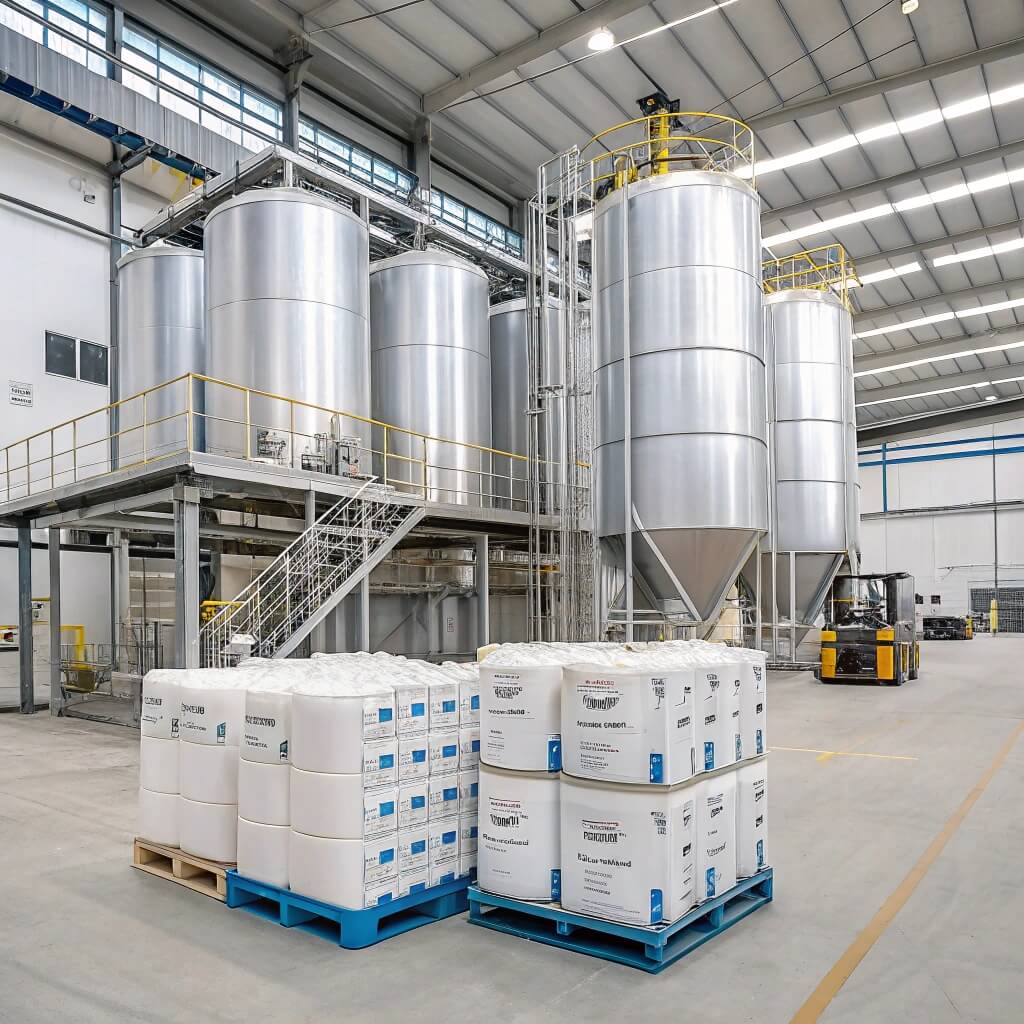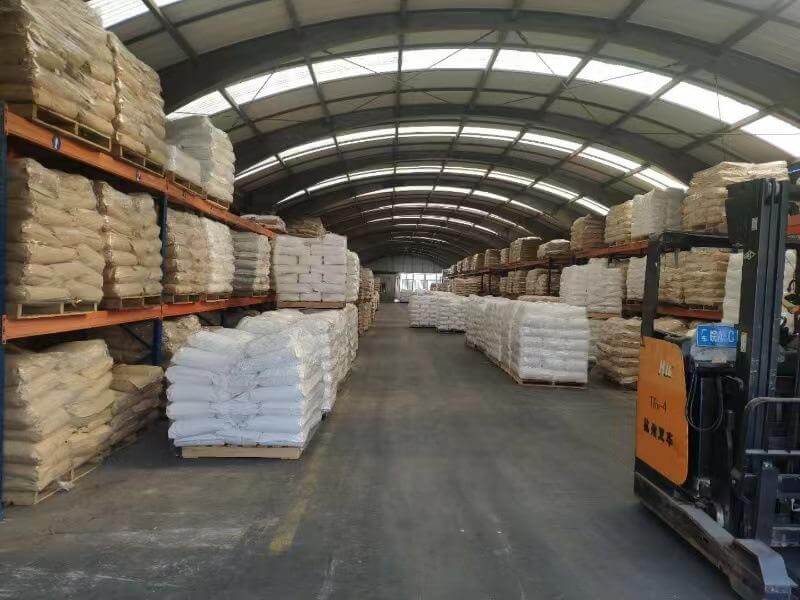Approvvigionamento Idrossipropilmetilcellulosa (HPMC) can be challenging, especially when balancing quality, price, and supply stability. Inconsistent viscosity, contamination, and unreliable suppliers can lead to costly disruptions. But does China’s dominance in HPMC manufacturing translate to reliable quality?
Chinese HPMC manufacturers follow strict quality control measures, international certification standards, and advanced production techniques to ensure consistency and reliability. With a well-established supply chain, China remains a major player in the global HPMC market.
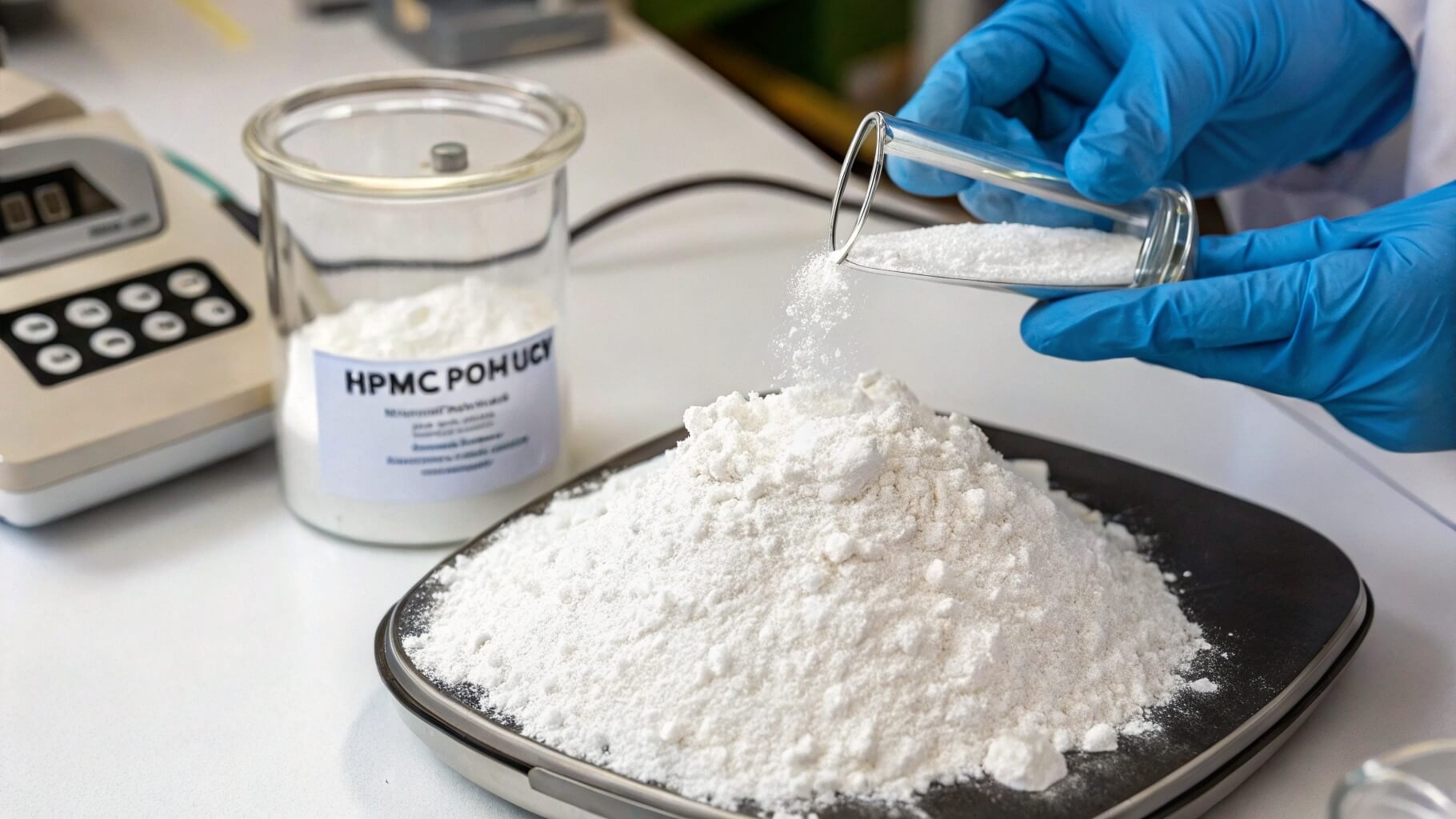
A laboratory technician testing the viscosity and purity of HPMC to ensure compliance with international standards.
China’s role in the mercato globale HPMC cannot be ignored. But what makes its manufacturers competitive, and how do they ensure quality? Let’s explore the key factors driving China’s HPMC industry.
What Makes HPMC from China a Key Player in the Global Market?
Poiché la domanda globale di Idrossipropilmetilcellulosa (HPMC) grows, China has emerged as a dominant supplier. But what factors position Chinese manufacturers as key players in the international market?
China leads the global HPMC market due to its large-scale production capacity, cost-efficient manufacturing, advanced technology, and strong export infrastructure. These advantages allow Chinese suppliers to meet international demand while maintaining competitive pricing.
Key Factors Driving China's HPMC Dominance
1. High Production Capacity & Economies of Scale
- La Cina ha some of the largest HPMC production facilities in the world.
- Large-scale manufacturing enables cost reduction and bulk supply stability.
- Economies of scale allow for competitive pricing without compromising quality.
2. Cost-Effective Manufacturing
- Abundant raw materials (cellulose sources) reduce production costs.
- Lower labor and operational expenses compared to Western manufacturers.
- Government support and industrial incentives enhance cost efficiency.
3. Tecnologia di produzione avanzata
- Adozione di linee di produzione automatizzate ensures batch-to-batch consistency.
- High-precision filtration and drying techniques maintain HPMC purity.
- Investimento in R&D and quality control systems improves product performance.
4. Forte infrastruttura di esportazione
- La Cina ha un well-established logistics network for global distribution.
- Major ports such as Shanghai, Ningbo, and Qingdao enable efficient international shipping.
- Affidabile customs processing and export documentation reduce shipping delays.
5. Conformità agli standard internazionali
- Leading manufacturers adhere to USP, EP, JP e REACH regulations.
- Strict quality testing ensures compliance with global construction, pharmaceutical, and food safety standards.
- Continuous improvements in environmental sustainability and production safety reinforce China’s role in the global market.
China's HPMC vs. Other Leading Producers
| Paese | Punti di forza | Punti deboli |
|---|---|---|
| Cina | Cost-effective, high production capacity, strong export network, global certifications | Alcuni fornitori di livello inferiore potrebbero non essere coerenti |
| Germania | Produzione ad alta purezza, R&S avanzata | Higher costs, lower output |
| India | Growing production, emerging supplier | Incongruenze nella qualità, inefficienze nella catena di fornitura |
| U.S.A. | Strict regulatory standards, premium-grade HPMC | Expensive, limited export volume |
China’s dominance in the Settore HPMC is backed by cost efficiency, manufacturing scale, and export capability, making it the preferred choice for global buyers. But how do Chinese manufacturers ensure consistent quality? Let’s examine their quality control practices.
How Do Chinese HPMC Manufacturers Maintain Quality Standards?
Consistency and quality are critical when sourcing Idrossipropilmetilcellulosa (HPMC). Given China's large-scale production, how do manufacturers ensure that each batch meets industry standards?
Chinese HPMC manufacturers maintain quality through strict raw material selection, advanced production processes, international certifications, and rigorous testing procedures. These measures guarantee consistency in viscosity, purity, and performance.
Key Quality Control Measures in Chinese HPMC Production
1. Selezione rigorosa delle materie prime
- Alta purezza cellulose sourced from trusted suppliers.
- Pre-production material screening to eliminate impurities.
- Chemical modification precision to achieve the required properties.
2. Processi di produzione avanzati
- Automated reaction control ensures uniform product consistency.
- High-precision filtration and drying techniques remove unwanted residues.
- coerente particle size control prevents formulation issues.
3. Conformità agli standard internazionali
- I principali produttori rispettano USP, EP, JP e REACH regulations.
- Regolare audit di terze parti verify production consistency.
- Certifications improve global market access and product reliability.
4. Rigorous Testing & Quality Assurance
- Test di viscosità e contenuto di umidità ensure stability.
- Analisi del pH e del grado di sostituzione confirm chemical integrity.
- Test batch-to-batch eliminates inconsistencies.
| Misura di controllo della qualità | Scopo |
|---|---|
| Test delle materie prime | Garantisce purezza e qualità della cellulosa. |
| Automazione dei processi | Riduce l'errore umano e migliora la coerenza dei lotti. |
| Certificazioni di terze parti | Verifica la conformità agli standard globali. |
| Test del prodotto finale | Conferma la viscosità, la purezza e le prestazioni. |
Customization & Quality Assurance
- Fornitori leader offer customized HPMC formulations to meet specific industrial needs.
- Adjustments in viscosità, velocità di dissoluzione e dimensione delle particelle enhance performance in construction, pharmaceuticals, and food applications.
Chinese manufacturers ensure a balance between high production volume and stringent quality control, rendendoli un trusted source for global buyers. But are all Chinese HPMC manufacturers consistent in quality, or do variations exist? Let’s analyze the differences among suppliers.
Are There Variations in HPMC Quality Among Chinese Manufacturers?
La Cina domina Hydroxypropyl Methylcellulose (HPMC) production, but not all suppliers offer the same level of quality. While some manufacturers adhere to rigorosi standard internazionali, others may cut corners, leading to inconsistencies in viscosity, purity, and performance.
HPMC quality varies among Chinese manufacturers due to differences in raw material sourcing, production technology, quality control protocols, and adherence to international certifications. Buyers must carefully evaluate suppliers to ensure consistent product quality.
Key Factors Causing Quality Variations
1. Approvvigionamento di materie prime
- High-end manufacturers source high-purity cellulose from trusted suppliers.
- Lower-tier producers may use lower-grade raw materials, leading to contamination risks.
- Inconsistent raw material sourcing can result in batch-to-batch variation.
2. Manufacturing Technology & Process Control
- Advanced facilities use linee di produzione automatizzate for precise chemical modification.
- Smaller factories often rely on manual processes, increasing variability.
- Poor filtration and drying techniques can lead to impurities in the final product.
3. Quality Control & Testing Standards
- Reputable suppliers conduct test di coerenza del lotto, ensuring uniform viscosity and purity.
- Alcuni produttori lack strict testing protocols, portando a fluttuazioni di qualità.
- Third-party lab certifications can help verify product consistency.
4. Conformità agli standard internazionali
- Top-tier manufacturers comply with USP, EP, JP, and REACH regulations.
- Alcuni fornitori only meet local standards, which may not align with global requirements.
- Gli acquirenti dovrebbero request COA (Certificate of Analysis) and independent lab reports to verify compliance.
Comparing Different Tiers of Chinese HPMC Suppliers
| Supplier Type | Punti di forza | Punti deboli |
|---|---|---|
| Top-Tier Manufacturers | High-purity raw materials, advanced technology, global certifications, consistent batch quality | Higher pricing due to strict quality control |
| Mid-Level Suppliers | Competitive pricing, moderate quality control, meets general industry standards | Occasional batch inconsistencies, limited R&D investment |
| Lower-Tier Producers | Cheapest pricing, flexible production | High risk of impurities, poor consistency, lack of certifications |
How to Avoid Low-Quality HPMC
- Richiedi report di test di laboratorio di terze parti before making bulk purchases.
- Verify production certifications (USP, EP, JP, REACH) to ensure compliance.
- Conduct supplier audits or request video inspections of manufacturing facilities.
- Start with small trial orders to assess batch consistency before scaling up.
Mentre many Chinese manufacturers offer reliable, high-quality HPMC, buyers must carefully assess suppliers to avoid quality risks. But beyond quality variations, how is Chinese HPMC used across different industries? Let’s explore its key applications.
What Are the Applications of Chinese HPMC in Different Industries?
Idrossipropilmetilcellulosa (HPMC) is a versatile additive with applications across multiple industries. While construction remains the largest consumer, Chinese HPMC is also widely used in pharmaceuticals, food production, cosmetics, and coatings due to its stabilizing, thickening, and binding properties.
Chinese HPMC is used in construction, pharmaceuticals, food production, personal care, and industrial coatings. Its ability to enhance viscosity, improve stability, and act as a binding agent makes it essential for various applications.
Key Industries Using Chinese HPMC
1. Industria delle costruzioni
- Adesivi e malte per piastrelle: Improves adhesion, water retention, and workability.
- Plasters & Renders: Enhances spreadability and crack resistance.
- Composti autolivellanti: Regulates flow properties and drying time.
- Gypsum-Based Products: Prevents shrinkage and increases strength.
2. Industria farmaceutica
- Tablet Coatings: Provides film-forming properties for controlled drug release.
- Capsules & Binders: Acts as a disintegration and binding agent in tablets.
- Ophthalmic Solutions: Functions as a viscosity enhancer in eye drops.
- Sustained Release Formulations: Controls drug dissolution rates.
3. Industria alimentare
- Dairy Products: Stabilizes yogurt, ice cream, and plant-based milks.
- Bakery & Dough Conditioners: Improves moisture retention and texture.
- Gluten-Free Products: Provides structural integrity in flour substitutes.
- Salse e condimenti: Enhances emulsification and prevents separation.
4. Cosmetici e cura della persona
- Shampoos & Conditioners: Enhances thickness and foaming stability.
- Lotions & Creams: Acts as a film-forming and moisturizing agent.
- Dentifricio: Improves texture and stability.
- Maschere per il viso: Provides hydration and skin adhesion.
5. Industrial Coatings & Paints
- Water-Based Paints: Regulates viscosity and improves application smoothness.
- Printing Inks: Enhances flow properties and adhesion.
- Adhesives & Sealants: Improves resistenza e durata del legame.
Industry-Specific HPMC Properties
| Industria | Key HPMC Functions |
|---|---|
| Costruzione | Water retention, adhesion, crack resistance |
| Prodotti farmaceutici | Tablet binding, controlled release, viscosity control |
| Cibo | Emulsification, thickening, moisture retention |
| Cosmetici | Film-forming, stabilizing, texture enhancement |
| Industrial Coatings | Viscosity regulation, adhesion improvement |
Chinese HPMC manufacturers produce formulazioni personalizzate tailored for industry-specific applications, ensuring high performance and compliance with regulatory standards. But beyond its applications, what are the pricing trends and market factors influencing the cost of Chinese HPMC? Let’s take a closer look.
What Are the Pricing Trends and Market Factors for Chinese HPMC?
The price of Idrossipropilmetilcellulosa (HPMC) fluctuates due to various market dynamics. While China remains the most cost-effective producer, factors like raw material costs, supply chain stability, and global demand influence pricing trends.
HPMC pricing is affected by raw material availability, production costs, supply chain efficiency, and global demand. Buyers must track these factors to secure stable pricing and avoid unexpected cost spikes.
Key Factors Influencing HPMC Pricing
1. Costi delle materie prime
- L'HPMC è derivato da cellulosa, mainly sourced from wood pulp and cotton linters.
- Fluctuations in global cellulose prices directly impact HPMC costs.
- Environmental policies affecting forestry and paper industries influence supply.
2. Production Costs & Energy Prices
- HPMC manufacturing requires chemical modification processes, which depend on energy-intensive operations.
- Rising electricity and fuel costs can drive up production expenses.
- Factories with efficient automation and process optimization offer more stable pricing.
3. Catena di fornitura e logistica
- Shipping rates and container availability impact the final cost of HPMC exports.
- Port congestion, customs delays, and global trade restrictions affect delivery times.
- Manufacturers with strong export networks provide more predictable lead times and cost stability.
4. Global Demand & Market Competition
- Construction and pharmaceutical industries drive consistent demand for HPMC.
- Emerging markets in India, Southeast Asia, and South America increase competition for supply.
- Seasonal fluctuations affect demand, particularly in construction.
5. Government Regulations & Trade Policies
- Tariffs, import duties, and export restrictions influence costs.
- Conformità con USP, EP, JP e REACH standards affects production complexity.
- Chinese government subsidies for chemical manufacturing impact pricing competitiveness.
Recent Pricing Trends in the Chinese HPMC Market
| Year | Average Price (USD/ton) | Key Influencing Factors |
|---|---|---|
| 2021 | $2,500 - $3,200 | High demand post-pandemic recovery |
| 2022 | $2,800 - $3,500 | Rising raw material and energy costs |
| 2023 | $2,700 - $3,300 | Stabilization after supply chain adjustments |
| 2024 (Projected) | $2,900 - $3,400 | Increased production efficiency, moderate demand growth |
Strategies for Buyers to Secure Stable Pricing
- Establish long-term contracts with suppliers to lock in favorable rates.
- Monitor cellulose and energy market trends to anticipate cost fluctuations.
- Source from multiple suppliers to mitigate risks associated with price surges.
- Negotiate bulk purchase discounts for consistent long-term orders.
Comprensione pricing trends and market dynamics helps buyers make informed sourcing decisions. But with so many manufacturers in China, how can businesses ensure they partner with a reliable supplier? Let’s explore the best selection criteria.
How to Choose a Reliable HPMC Manufacturer in China?
Con numerosi Idrossipropilmetilcellulosa (HPMC) manufacturers in China, selecting the right supplier is critical to ensuring consistent quality, reliable delivery, and compliance with international standards. But how can buyers differentiate between trustworthy suppliers and unreliable ones?
To choose a reliable Chinese HPMC manufacturer, buyers should evaluate certifications, production capacity, quality control processes, pricing transparency, and logistics capabilities. Conducting factory audits, requesting sample testing, and verifying compliance with global regulations are essential steps.
Key Factors to Consider When Selecting an HPMC Supplier
1. Certifications & Regulatory Compliance
- Certificazioni USP, EP, JP e REACH confirm adherence to international standards.
- ISO 9001 certification ensures a structured quality management system.
- Third-party COA (Certificate of Analysis) and MSDS (Material Safety Data Sheets) verify product consistency.
2. Manufacturing Capacity & Technological Capabilities
- Large-scale manufacturers use linee di produzione automatizzate per la coerenza dei lotti.
- Avanzato filtration and drying technologies prevent contamination.
- Un forte R&D team ensures innovation and customized formulations.
3. Quality Control & Testing Protocols
- Batch-to-batch viscosity testing guarantees uniform performance.
- pH and moisture content analysis prevents chemical instability.
- Suppliers should provide third-party lab test reports upon request.
4. Pricing Transparency & Cost Structure
- Evita i fornitori con costi nascosti related to packaging, documentation, or export fees.
- Compare pricing based on HPMC grade, viscosity levels, and purity.
- I contratti a lungo termine possono stabilize pricing and secure better terms.
5. Affidabilità della catena di fornitura e della logistica
- Established suppliers have strong export networks for faster shipping.
- Proximity to major ports (Shanghai, Ningbo, Qingdao) ensures distribuzione globale efficiente.
- Fornitori con experience in customs documentation minimize delays.
Lista di controllo per la valutazione del fornitore
| Criteri | Perché è importante |
|---|---|
| Certificazioni e conformità | Ensures global regulatory acceptance. |
| Capacità produttiva | Reduces supply disruptions and ensures scalability. |
| Coerenza del lotto | Prevents formulation failures and material defects. |
| Prezzi trasparenti | Eliminates unexpected costs and improves budgeting. |
| Export & Logistics Expertise | Facilitates smooth international shipments. |
Segnali di pericolo a cui fare attenzione
- Mancanza di certificazioni verificabili – Could indicate weak quality control.
- Prezzi irrealisticamente bassi – May reflect inferior raw materials or process shortcuts.
- Comunicazione incoerente – Delayed responses may signal operational inefficiencies.
- Nessun campione disponibile – Reputable suppliers should offer test samples prima degli ordini all'ingrosso.
Scegliere il right HPMC manufacturer è essenziale per il mantenimento product performance and supply chain stability. But is Chinese HPMC ultimately a reliable choice for international buyers? Let’s summarize the key insights.
Final Thoughts: Is Chinese HPMC a Reliable Choice for Your Business?
For businesses seeking Idrossipropilmetilcellulosa (HPMC), China remains a dominant global supplier. But is sourcing from Chinese manufacturers truly a reliable option?
Chinese HPMC manufacturers provide cost-effective, high-quality, and globally certified products, making them a dependable choice for buyers in construction, pharmaceuticals, food, and industrial applications. However, supplier selection is key to ensuring consistent quality and long-term reliability.
Why Chinese HPMC is a Strong Option for Buyers
- Efficienza dei costi – Large-scale production lowers manufacturing costs.
- Global Certifications – Many suppliers meet USP, EP, JP e REACH standard.
- Alta capacità produttiva – Ensures consistent supply and scalability.
- Technological Advancements – Automated processes improve product uniformity.
- Export Readiness – Well-established logistics support global shipping.
Key Considerations Before Choosing a Supplier
- Verify certifications and lab reports to confirm compliance with international standards.
- Conduct supplier audits or request production facility inspections.
- Start with sample orders to test batch consistency before committing to bulk purchases.
- Assess pricing structures to avoid hidden costs or supply chain risks.
For businesses looking for a fornitore affidabile di HPMC, lavorando con verified and experienced manufacturers in China ensures stable quality, efficient procurement, and competitive pricing. To discuss your specific HPMC needs, reach out to industry experts today.
Domande frequenti
Chi è il fornitore di HPMC in Cina?
La Cina ha numerosi Idrossipropilmetilcellulosa (HPMC) fornitori, che vanno dai produttori su larga scala alle società commerciali specializzate. I fornitori leader in genere detengono Certificazioni USP, EP, JP e REACH ed esportare a livello globale. Gli acquirenti dovrebbero valutare i fornitori in base a controllo di qualità, capacità produttiva ed esperienza di esportazione per garantire la coerenza.
L'HPMC è approvato dalla FDA?
HPMC is considered Generalmente riconosciuto come sicuro (GRAS) dal Amministrazione per gli alimenti e i farmaci (FDA) degli Stati Uniti for specific applications, particularly in industrie farmaceutiche e alimentari. However, manufacturers must ensure compliance with FDA regulations and Good Manufacturing Practices (GMP) for their specific formulations.
Quali sono i diversi gradi di HPMC?
HPMC is available in multiple grades, depending on its viscosity, substitution level, and intended use:
| Grado HPMC | Applicazione |
|---|---|
| Grado di costruzione | Tile adhesives, mortar, plaster, self-leveling compounds |
| Grado farmaceutico | Tablet coatings, capsules, controlled drug release |
| Grado alimentare | Dairy products, gluten-free foods, sauces, bakery items |
| Cosmetic & Personal Care Grade | Shampoos, lotions, creams, toothpaste |
| Grado industriale | Vernici, rivestimenti, adesivi |
Each grade has specific viscosity levels and functional properties, making selection crucial based on end-use requirements.
Qual è meglio, CMC o HPMC?
La scelta tra Carbossimetilcellulosa (CMC) E Idrossipropilmetilcellulosa (HPMC) depends on application needs:
| Proprietà | HPMC | CMC |
|---|---|---|
| Ritenzione idrica | Alto | Moderare |
| Adesione | Stronger | Più debole |
| Effetto ispessimento | Moderare | Più alto |
| Capacità di formazione di film | Eccellente | Limitato |
| Applicazioni | Construction, pharma, food, coatings | Cibo, detersivi, carta, tessili |
HPMC is preferred in construction, pharmaceuticals, and coatings a causa della sua film-forming properties and enhanced stability, whereas CMC is commonly used in food, detergents, and paper applications.

